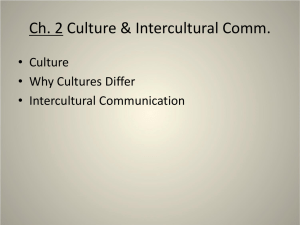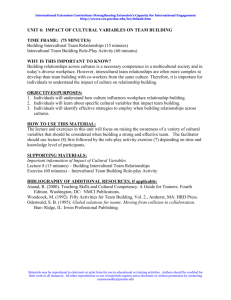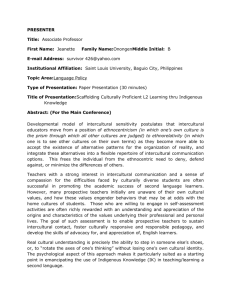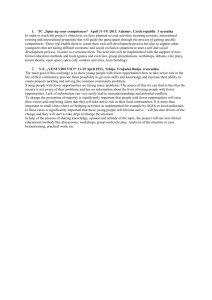Pathways for a Shared Future – Changing Roles in a... Workshop 3 – Intercultural Leadership and Change
advertisement
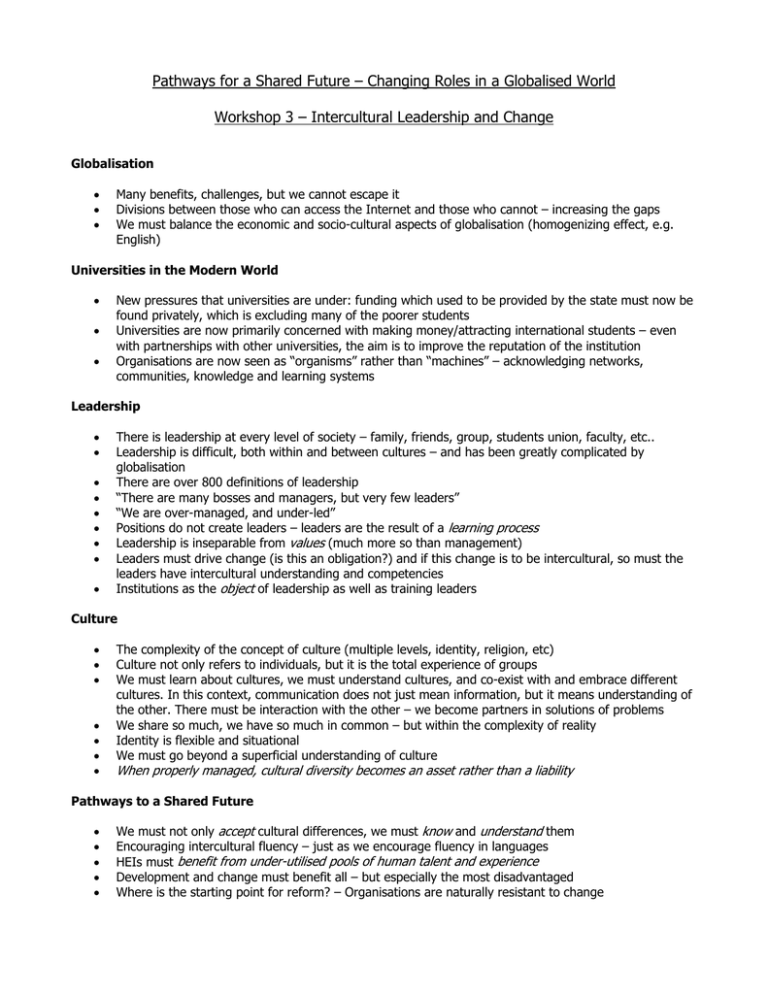
Pathways for a Shared Future – Changing Roles in a Globalised World Workshop 3 – Intercultural Leadership and Change Globalisation • • • Many benefits, challenges, but we cannot escape it Divisions between those who can access the Internet and those who cannot – increasing the gaps We must balance the economic and socio-cultural aspects of globalisation (homogenizing effect, e.g. English) Universities in the Modern World • • • New pressures that universities are under: funding which used to be provided by the state must now be found privately, which is excluding many of the poorer students Universities are now primarily concerned with making money/attracting international students – even with partnerships with other universities, the aim is to improve the reputation of the institution Organisations are now seen as “organisms” rather than “machines” – acknowledging networks, communities, knowledge and learning systems Leadership • • • • • • • • • There is leadership at every level of society – family, friends, group, students union, faculty, etc.. Leadership is difficult, both within and between cultures – and has been greatly complicated by globalisation There are over 800 definitions of leadership “There are many bosses and managers, but very few leaders” “We are over-managed, and under-led” Positions do not create leaders – leaders are the result of a learning process Leadership is inseparable from values (much more so than management) Leaders must drive change (is this an obligation?) and if this change is to be intercultural, so must the leaders have intercultural understanding and competencies Institutions as the object of leadership as well as training leaders Culture • • • • • • • The complexity of the concept of culture (multiple levels, identity, religion, etc) Culture not only refers to individuals, but it is the total experience of groups We must learn about cultures, we must understand cultures, and co-exist with and embrace different cultures. In this context, communication does not just mean information, but it means understanding of the other. There must be interaction with the other – we become partners in solutions of problems We share so much, we have so much in common – but within the complexity of reality Identity is flexible and situational We must go beyond a superficial understanding of culture When properly managed, cultural diversity becomes an asset rather than a liability Pathways to a Shared Future • • • • • We must not only accept cultural differences, we must know and understand them Encouraging intercultural fluency – just as we encourage fluency in languages HEIs must benefit from under-utilised pools of human talent and experience Development and change must benefit all – but especially the most disadvantaged Where is the starting point for reform? – Organisations are naturally resistant to change • Both local and international students and staff benefit from their interaction – and this must be promoted through activities, programmes and be reflected in university curricula. • • • • HEIs must be profitable, must be sustainable Æ Intercultural competencies must be part of university programs Universities must set an example and educate future leaders Mandatory courses for intercultural competence? (for leaders and for students) Curricula for intercultural leadership courses must include ethics Policy Recommendations • • • We must emphasise the centrality of culture in debate, acknowledging “taboo” subjects such as religion and philosophy Intercultural training for leaders, including practical training and ethics, to promote intercultural leadership Integrate the values of intercultural involvement into the mission statements, policies and curricula of universities, as instruments to achieve change Attributes Teamwork Communication skills Problem solving Critical thinking Intercultural literacy Values Recognising and Using Diversity Languages Ethical values Dignity of Human Beings Curriculum is the instrument for this

